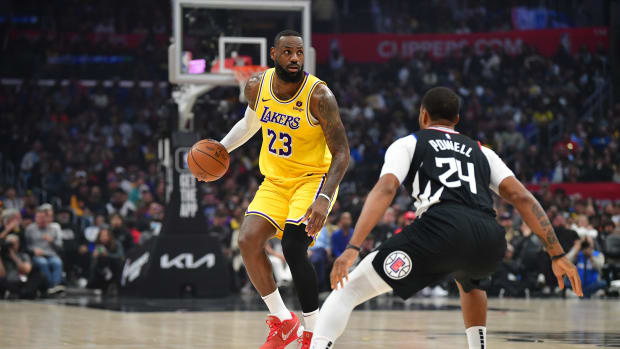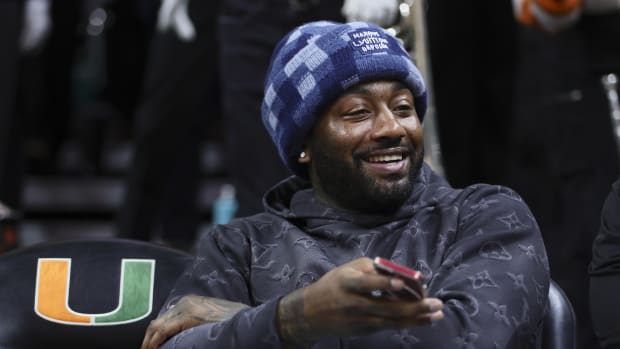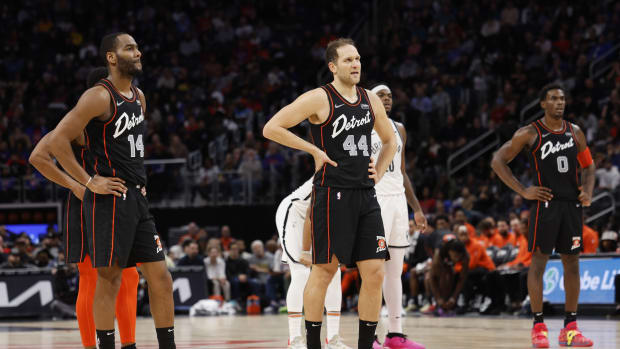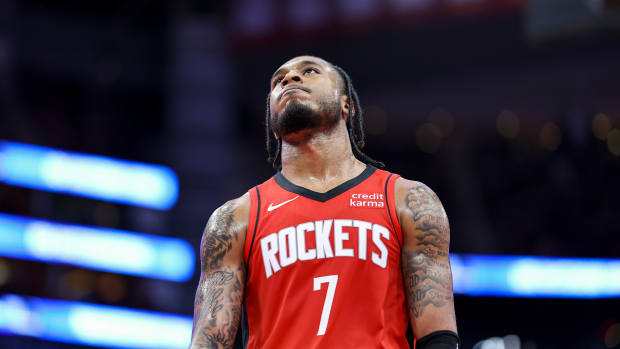Should the Knicks Try to Trade for Kyrie Irving Now?
As the wave of earth-shaking NBA news rumbles on this week—here’s something to chew on until the next bit of news breaks. With the Celtics, Knicks and Pelicans all approaching uncertain junctures and the trade deadline on the horizon, the domino effect of Anthony Davis’s trade request on the entire league requires some additional thought. Here, then, is a scenario that could work to satisfy all three parties.
First, a quick rundown of an increasingly league-wide epidemic of superstar unhappiness. The Knicks made a clear statement of intent by dealing Kristaps Porzingis on Thursday: New York is placing all their chips on bringing in superstar talent. Most signs point to the Knicks targeting Kevin Durant, who is expected to take meetings and look at his options this summer, and Kyrie Irving, who is expected to opt out of the final year of his deal in Boston. Irving’s comments on Friday—intimating he would keep all of his options open in free agency—corroborate recent rumblings around the league that he is far from a lock to remain a member of the Celtics, despite more or less verbally committing to re-signing before the season.
Meanwhile, the specter of a Davis trade—and his camp’s machinations to land him with the Lakers—continues to hang over the entire league. The primary reason why the Pelicans can afford to wait to make a deal is because the Celtics can come to the table after the season with young talent and multiple first-round picks. The reason why Boston has to wait is because they can’t simultaneously roster Davis and Kyrie Irving, because both are signed to designated rookie extensions, of which teams are only allowed to have one on payroll. The prospect of Boston’s best offer gives New Orleans immediate leverage over Los Angeles and any other bidder going into Thursday’s deadline, no matter how much Davis’ agent, Rich Paul, attempts to get the point across that they are not interested in signing with the Celtics long-term.
MANNIX: Knicks Take Big Swing With Porzingis Trade—Will It Be Worth It?
There are a number of crucial contingencies with this scenario—which make it speculative, to be fair, but think about it. Assume that Boston knows it might lose Irving. Assume that the Celtics knew they had enough to acquire Davis from the Pelicans before the deadline if they moved Irving first. We know for a fact the Knicks want star talent, and that the Knicks are now armed with forthcoming cap space and future first-rounders after dealing Kristaps Porzingis. New York could bid on multiple max free agents, but they are also in terrific position to trade for one. With Irving’s situation now publicly in flux, the Knicks should at least be calling Boston.
Of course, there is the possibility that Irving might sign in New York this summer anyway, which is fair, but there are a number of advantages the Knicks would gain by acquiring him immediately. The primary reason is the value of owning Irving’s Bird Rights, which they can only acquire via trade. That would allow New York to go over the salary cap when re-signing him this summer, allows them to offer him the most long-term money, and most importantly, puts their first superstar in play before free agency even begins.
There is a legitimate perception that the Knicks can’t keep their best players happy; the Porzingis fallout and the history of ownership under James Dolan mostly affirms that. The optics of sitting down with, say, Kevin Durant and already having Irving committed are immensely valuable when it comes to making New York a destination. Going to get Irving demonstrates the Knicks are serious, and inarguably makes for a much more convincing pitch. And the best way to guarantee you have Irving in the fold and keep him off the market is, well, to go get him.
As it stands, the Knicks can renounce the cap holds to all their free agents go into the off-season with about $24.4 million in salary on the books, with only Dennis Smith Jr., Frank Ntilikina, Lance Thomas, Kevin Knox, Mitchell Robinson and Damyean Dotson under guaranteed contract. The cap for 2019-20 is expected to be set at around $109 million, and Irving’s cap hold would be approximately 150% of his previous salary—so roughly $30.1 million—leaving the Knicks with about $54.6 million in space. That’s enough to sign a max player, use the rest of the space to fill out the supporting cast, and re-sign Irving at the end of operations to go over the cap. If nothing else, it’s entirely preferable to a scenario where the Knicks enter July with no bird in hand, only the promise of cash and what the team might look like to a prospective signing. If you’re New York and you think you can keep Irving, you’re calling Boston.
NADKARNI: The Porzingis Trade Is All About Kevin Durant for the Knicks
The math in a hypothetical Knicks/Celtics deal works something like this: for Irving at his salary number, the Knicks can offer any of their own future first-rounders or the ones they just acquired from Dallas, packaged with one of their three expiring contracts. Scenario A: New York offers DeAndre Jordan or Wesley Matthews plus two future firsts. (Because they were just acquired, Jordan and Matthews cannot be combined with any other players). Scenario B: New York offers Kanter, Kevin Knox and a future first.
If New York is serious, thinks they can legitimately land a second star, and wants to operate like a big-market team, they sacrifice the assets to do the deal. Knox’s development timeline doesn’t align with the immediacy of a Durant-Irving pairing, the Knicks will still have their own first-rounders, and if the big guns fall into place, fans would get over it. It’s scary to think about, but if the Knicks are really all-in on building a contender, they do the deal. And for what it’s worth, it would almost be foolhardy to think they’d to the Porzingis deal without knowing they had at least one big free agent on the way.
Again, from Boston’s perspective, you only do this deal operating with the knowledge that New Orleans will send you Davis. If the Celtics want to roll the dice on keeping the transcendent big man long-term, acquiring him now—with the prospect of having Davis around for not one, but two playoff runs—maximizes Boston’s window to sell him on staying. If the Celtics fear Irving will depart for nothing, then flipping whatever assets are necessary for Davis, a player who could flip the Eastern Conference for two years with his presence regardless of whether he wants to be a Laker, might be well worth it. The Celtics would also create some cap space with whichever contract they acquire from the Knicks.
SHARP: The Porzingis Trade Was Smart. Everyone Calm Down
If Boston can move Irving in the above scenario, then their offer to New Orleans for Davis could include Jaylen Brown (made easier by the hypothetical addition of Knox), Marcus Smart, Marcus Morris, and whatever number of first-rounders it would take to sway the Pelicans. It would more or less be an offer New Orleans couldn’t afford to refuse.
The Celtics could turn to the buyout market to fill out their playoff rotation, and figure it out going into next season with Davis, Gordon Hayward, Al Horford and Jayson Tatum as their principals, plus the possibility of re-signing Terry Rozier, and whatever Knox becomes. While having Irving in place would obviously help their chances of keeping Davis long-term, Boston has a creative, shrewd front office, would still have more draft picks to dangle to improve the team, and would maintain a legitimate pathway to winning the East—just maybe not this year. Still, you can argue that with Irving’s situation unstable as it is, Hayward not fully back to being himself, and Boston’s bouts of inconsistency, the likelihood of them making the Finals in 2019 remains slim. The long view here might even be more promising.
This is all speculation—that probably needs to be spelled out again—and it’s a complex scenario. But, it’s a hypothetical where all three teams win. The Knicks orient themselves to contend in the Eastern Conference next season and still have a full stash of their own draft picks; the Celtics avert the risk of Irving’s departure, inherit the best opportunity to keep Davis around, still have draft assets and get to streamline their roster creatively; the Pelicans avoid handing Davis to Los Angeles and receive the best possible haul of picks to build for the future. Far-fetched? Maybe. Sensible? Maybe more than you think.


































